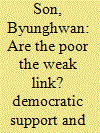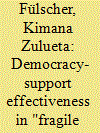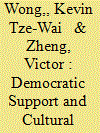| Srl | Item |
| 1 |
ID:
147308


|
|
|
|
|
| Summary/Abstract |
Extant literature on democratization documents that ordinary citizens’ unconditional support for democracy is indispensable to democratic consolidation. Yet observers of nascent democracies have repeatedly witnessed that such support often hinges upon their economic conditions. This article argues that income levels have a conditioning effect on this relationship; the Korean poor see democracy as a tool for income redistribution and are less likely than the rich to support it when economic hardships appear to close windows of opportunities for such redistribution. Using survey data from the first round of the Asian Barometer Survey on South Korea, I find strong empirical support for this argument. The implication of this finding for broader literature on democratization is that the weakening of young democracies can be attributed to the poor in times of trouble, or the “weak link.”
|
|
|
|
|
|
|
|
|
|
|
|
|
|
|
|
| 2 |
ID:
130928


|
|
|
|
|
| Publication |
2014.
|
| Summary/Abstract |
Processes of political transformation and external assistance in fragile states have received increasing attention in the academic literature over the past decade. This literature, however, has not yet adopted a multi-dimensional categorization of fragility. This article discusses the evolution of the concept of fragility, and assesses the growing literature on processes of political transformation in fragile states, with a special focus on the quantitative literature and on the effectiveness of external democracy-support policies. Its novelty lies in its contribution to drawing links between these parallel bodies of literature. Furthermore, this article argues that, by incorporating a more complex definition of fragility, future research could reach more nuanced approaches on how fragility influences both processes of democratization and the effectiveness of democracy-support policies.
|
|
|
|
|
|
|
|
|
|
|
|
|
|
|
|
| 3 |
ID:
161204


|
|
|
|
|
| Summary/Abstract |
This article examines the possible negative impacts of two East Asian traditional values—the notion of paternalistic meritocracy and the instrumental perception of ideal political arrangements—on popular support for democracy in Hong Kong and East Asian societies. Based on data drawn from various surveys, East Asians are found to be quite attached to paternalistic meritocracy and democratic instrumentalism. Comparatively, Hong Kong people are less inclined to perceive democracy in a procedural way although they are less attached to paternalistic meritocracy. Regression analysis demonstrates a negative correlation between these two values, with a preference for democracy.
|
|
|
|
|
|
|
|
|
|
|
|
|
|
|
|
| 4 |
ID:
170995


|
|
|
|
|
| Summary/Abstract |
Indonesia is a country of significant inequalities, but we know little about how Indonesians feel about the gap between rich and poor. Comparative research suggests that negative perceptions of inequality can erode public support for democratic institutions. Using survey data, we explore the relationship between inequality and support for democracy in Indonesia. We find Indonesians are divided in their beliefs about income distribution. But this variation is not determined by actual levels of inequality around the country, nor by people's own economic situation; instead, political preferences and partisan biases are what matter most. Beliefs about inequality in Indonesia have become increasingly partisan over the course of the Jokowi presidency: supporters of the political opposition are far more likely to view the income gap as unfair, while supporters of the incumbent president tend to disagree—but they disagree much more when prompted by partisan cues. We also find that Indonesians who believe socio-economic inequality is unjust are more likely to hold negative attitudes toward democracy. We trace both trends back to populist campaigns and the increasingly polarized ideological competition that marked the country's recent elections. The shift toward more partisan politics in contemporary Indonesia has, we argue, consequences for how voters perceive inequality and how they feel about the democratic status quo.
|
|
|
|
|
|
|
|
|
|
|
|
|
|
|
|